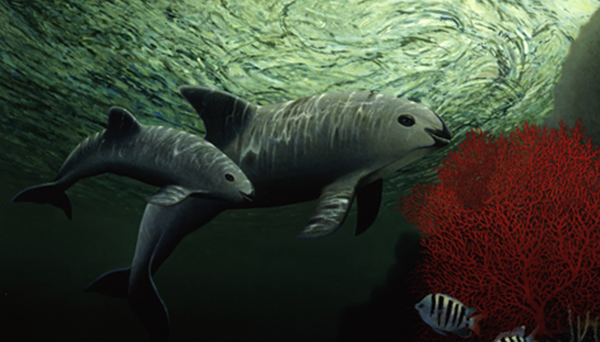Recovering the Vaquita and Promoting Sustainable Local Livelihoods
Status: Completed
Operational Plan: 2009
The purpose of this project is to support Mexico’s recovery strategy for this species and to steward the implementation of a North American Conservation Action Plan (NACAP), to eliminate incidental bycatch of vaquita.
Launched in 2008, the Vaquita NACAP supports Mexico’s significant commitment of financial and other resources towards accomplishment of its conservation and socio-economic goals related to the recovery of this species.

Background
The vaquita is the world’s smallest and most endangered marine cetacean, and its current distribution range is the most limited with its total population estimated at only about 150 individuals. It is in critical danger of extinction, primarily due to incidental mortality in entangling nets.
The purpose of this project is to support Mexico’s recovery strategy for the vaquita by facilitating trinational cooperation and the implementation of the North American Conservation Action Plan (NACAP) for this species.
Rational
Although the vaquita is found only in Mexican waters, Canada and the United States are rendering their efforts and their established know-how in the recovery of species, to forge an alliance to eliminate bycatch and promote sustainable livelihoods.
The NACAP provides an outlook on the species, an updated account of its situation, the main factors causing its mortality, and the cooperative conservation actions to be taken.
Key Activities
- Research, monitor and evaluate the state of the vaquita population.
- Increase awareness of the vaquita, its plight, and importance within its ecosystem.
- Explore innovative approaches to develop sustainable livelihoods in the communities.
- Facilitate the trilateral exchange of researchers, including resource and fishery economists.
- Support the exchange of information of successful case studies in Canada and the US.
- Implementation of experimental use of alternative fishing gears.
Achievements
- Reduction of by-catch to zero vaquitas.
- Recovery and conservation of the vaquita and its habitat.
- Effective incentives for local fishermen to eliminate the use of unsustainable fishing gears.
- Increased knowledge and information about the health and status of the vaquita population.
- Improved trinational collaboration on the prevention and reduction of incidental by-catch.
Future Work
All aspects of this project are designed to be completed in 2009. It is expected that the lessons learned by the implementation of this and other marine NACAPs will allow the Parties to continue working together, using this as a framework for targeted collaborative actions.